|
|
|
Sort Order |
|
|
|
Items / Page
|
|
|
|
|
|
|
| Srl | Item |
| 1 |
ID:
147215
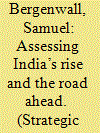

|
|
|
|
|
| Summary/Abstract |
This article analyses India’s economic, military and political rise in the international state system. It concludes that India is on the rise in all three power dimensions, underpinned by a larger share of global GDP. However, it also identifies the constraints on the way. On matters concerning its economy, India lags behind in industrial prowess, innovation, socio-economic development and financial strength. While modernising its defence capabilities, it faces obstacles due to budget issues, institutional constraints and a weak defence industry. At the global level, its political leverage is circumscribed by its small diplomatic corps, limited foreign aid, underutilised soft power assets and by an immediate neighbourhood that consumes much of its political energy. India’s rise could also be delayed by various domestic constraints as well as failure to adapt to ‘the second machine age’ and ‘the return of geopolitics’. Nevertheless, the probabilities of India’s continued rise in the international system are good, given its favourable demographics and catch-up opportunities related to labour productivity, urbanisation and digitisation.
|
|
|
|
|
|
|
|
|
|
|
|
|
|
|
|
| 2 |
ID:
138399
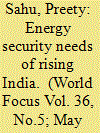

|
|
|
|
|
| Summary/Abstract |
Energy is an important input for any economy, especially for a rapidly rising economy like India. A large portion of Indian masses use bio-mass and fossil fuel as energy resources. However India’s demand for commercial energy is quite high while availability is low.
|
|
|
|
|
|
|
|
|
|
|
|
|
|
|
|
| 3 |
ID:
166849
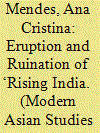

|
|
|
|
|
| Summary/Abstract |
In 2000, the writer Rana Dasgupta moved from New York to Delhi, reversing his father's act of migration in the 1960s, to find a new, but already obsolescent, ‘rising India’. This was the India of the economic boom, whose extent and import have been increasingly under scrutiny. With reference to the temporalities of ‘rising India’, the purpose of this article is to examine the representation of globalization's multiple temporalities in Dasgupta's non-fiction work Capital: The Eruption of Delhi (2014). Capital is a returnee author's personal attempt to inhabit the multiple temporalities of Delhi, wherein the pull of globalization—here understood as neo-liberal corporate economic globalization—is alternatively embraced and resisted. This article argues that the conceptual limitations of the multiple-modernities framework are reflected in Dasgupta's representation of the multiple temporalities of globalization. It is through politicized and territorialized genealogies of ‘imperial debris’ such as Dasgupta's that we can arrive at new critiques of modernity. At the same time, this article is concerned with the ways in which Dasgupta's fractured and multi-temporal present of Delhi, inhabited by the old and the new, is being captured by a returnee from the United States of America to India who is concurrently the ‘other’ from ‘abroad’ and the ‘same’ at ‘home’. Ultimately, the book's re-Orientalist frame underscores, from the outset, the difficulty in decoupling ideas of modernity and progress from a Eurocentric, Enlightenment project.
|
|
|
|
|
|
|
|
|
|
|
|
|
|
|
|
| 4 |
ID:
131027
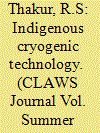

|
|
|
|
|
| Publication |
2014.
|
| Summary/Abstract |
From launching sounding rockets on the Kerala coast in the 19605, to the launch of ten satellites in one go in April 2008, Indian space scientists have indeed come a long way. In fact, this January, taking one more crucial step in space technology has further strengthened their resolve to accomplish other space-related goals. After two decades of the protracted and focussed research and developmental efforts of the Indian Space Research Organisation (ISRO) scientists, it was India's turn to celebrate the glory of its space programme on January 05, 2014, when ISRO's Geosynchronous Satellite Launch Vehicle (GSLV-D5), powered by an indigenously developed cryogenic engine, successfully launched the GSAT- 14, a communication satellite, from Sriharikota
|
|
|
|
|
|
|
|
|
|
|
|
|
|
|
|
| 5 |
ID:
131028
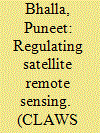

|
|
|
|
|
| Publication |
2014.
|
| Summary/Abstract |
The freedom of operations in space and of remote sensing by satellites has been globally accepted through different UN Conventions. Satellite imaging provides unrestricted access to areas transcending international borders and its commercialisation has resulted in the irrelevance of these borders even for distribution of data as commercial entities seek a larger and more diversi?ed customer base. Availability of such information commercially is enabling and in?uencing worldwide scienti?c, technological, social and economic advancements. However, its dual use potential that could provide disproportionate strategic and military advantages has raised concerns regarding the distribution. Differing interests have made regulating the sector a complex task. Nations that possess the capability want to strike a balance between their national security interests and foreign policy concerns, on the one hand, and commercial interests, on the other. At the same time, all nations remain apprehensive about the distribution of information about their area without their knowledge or consent.
|
|
|
|
|
|
|
|
|
|
|
|
|
|
|
|
| 6 |
ID:
079375
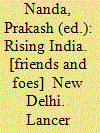

|
|
|
|
|
| Publication |
New Delhi, Lancer, 2007.
|
| Description |
xxxv, 392p.hbk
|
| Standard Number |
0979617413
|
|
|
|
|
|
|
|
|
|
|
|
Copies: C:1/I:0,R:0,Q:0
Circulation
| Accession# | Call# | Current Location | Status | Policy | Location |
| 052644 | 954/NAN 052644 | Main | On Shelf | General | |
|
|
|
|
| 7 |
ID:
097106
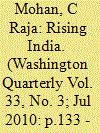

|
|
|
|
|
| Publication |
2010.
|
| Summary/Abstract |
One of the major emerging U.S. security debates is the impact of rising powers on managing global commons such as the sea, air, space, and cyberspace domains. If the U.S. command of the commons was taken for granted a decade ago,1 current concerns include the consequences of relative U.S. decline, the rapid diffusion of technological capabilities, crowding of the global commons, and the challenge of managing the commons in a multipolar world.2 India's significant technological capabilities and operational programs to exploit the commons are not in doubt. What is not clear, however, is whether the U.S. strategic community sees India as a potential partner in managing the global commons.
|
|
|
|
|
|
|
|
|
|
|
|
|
|
|
|
| 8 |
ID:
138392
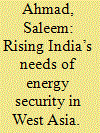

|
|
|
|
|
| Summary/Abstract |
Now the time has come to take bold initiatives in the Gulf region to secure its geo-political interest and it is necessary for India to make security arrangements by the help of the United States and China. If they are unwilling to cooperate, Rising India must take this initiative by itself. Because regular supply of energy is important for India but the routes of energy supply is too important for rising India.
|
|
|
|
|
|
|
|
|
|
|
|
|
|
|
|
| 9 |
ID:
131025
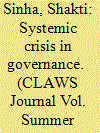

|
|
|
|
|
| Publication |
2014.
|
| Summary/Abstract |
Till a few years ago, the Indian elite had convinced itself that India was already seated at the high table of the international order, that there was something natural and given about lndia's rise. This acute sense of triumphalism was unmistakeable. India in 2007 had reason to be con?dent. It was growing fast and furious, had lifted hundreds of millions above the poverty line, and was being courted by leading economies and large investors and the India story seemed a perpetual best-seller. The 2008 trans-Atlantic monetary crisis saw the rich countries go into economic decline whilst India recovered quickly and grew faster than before. The clear conviction was that India had decoupled itself from its economic partners in Europe and North America, and was itself an engine of global economic growth. The fact that China also grew faster than before convinced many that the West was in terminal decline and the future of Asian dominance had arrived. The hubris was not long in coming. Indian policy-makers did seem to have not taken notice of the fact that the high growth of Gross Domestic Product (GDP) post-2003 had resulted Mr Shakti Sinha is former Principal Secretary (Power 8: Industry), Government of National Capital Territory of Delhi and former Chief Secretary, Andaman 8: Nicobar Administration.
|
|
|
|
|
|
|
|
|
|
|
|
|
|
|
|
|
|
|
|
|